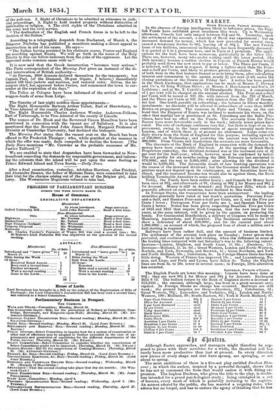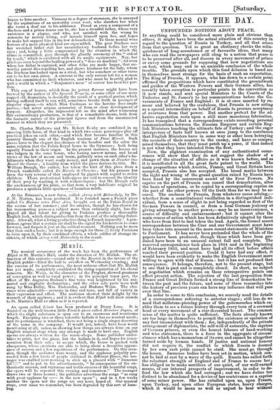.64r ittattro.
Although Easter approaches, and managers might therefore be sup- posed to pause with their novelties for a while, the theatrical soil has rarely been more productive than just at present. In every direction new pieces of every shape and size have sprung, are springing, or are about to spring. The most ambitious of these is a five-act play entitled Duchess Elea- 'tour • in which the author, inspired by a powerful thought, shows that he has not at command the form that would endow it with fitting ex- pression. The hapless Duchess, who gives the title to the play, is doubt- less intended for a grand psychological study ; being entangled in a net of horrors, every mesh of which is painfully irritating to the captive. An actress adored by the public, she has married a reigning duke, who adores her no longer, and has to endure the agony of thinking that he hiss
begun to love another. Virtuous to a degree of sternness, she is annoyed by the aspirations of an unworthy court roué, who slanders her when she turns a deaf ear to his addresses. Proud as even a compound of a duchess and a prima donna can be, she has a dreadful father, whose very existence is a plague, and who, not satisfied with the wrong he commits by merely living, will intrude himself upon her, and hopes to make her support him in his low debaucheries. To these mental woes horrors of a more physical kind are superadded. The poor Duchess sees her wretched father stab her unsatisfactory husband before her very eyes ; and, being a little compromised by the situation in which the crime is committed, goes through the ghastly ceremony of the "ordeal by touch," which is exhibited with all its ample equipments. Nay, her griefs are even beyond the healing power of a "dens ex machina " ; for even when her father is captured, and other folks are made happy, that un- worthy parent dies repelling her, and shows kindness for the lady, whom the Duchess has looked upon as a rival, but who somehow or other turns out to be her own sister. A convent is the only retreat left for a woman who has committed no fault whatever, and who must be heartily glad to quit a world in which a "Benjamin's mess" of sorrow has been her por- tion.
This cup of horror, which from its potent flavour might have been brewed by the author of The Spanish Tragedy, or some other of our more rugged old dramatists, is decidedly the result of a poetical genius, which having suffered itself to run wild, sometimes breaks forth in passages of singular vigour,—to which Miss Cushman as the heroine does ample justice,—but never attains symmetry of form or clear development of purpose. Altogether, the impression left on the mind after witnessing this extraordinary production, is that of a remarkable dream, both from the fantastic nature of the principal figures and from the unconnected manner in which they are presented.



























 Previous page
Previous page